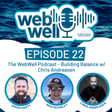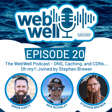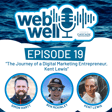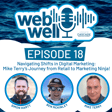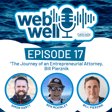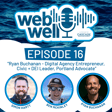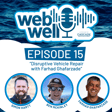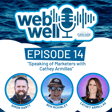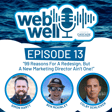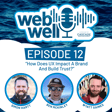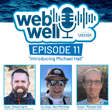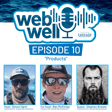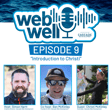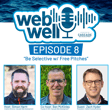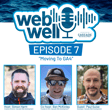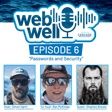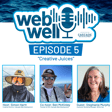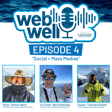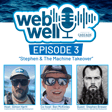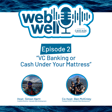Introduction and Guest Background
00:00:08
Speaker
Welcome back to the Web Well Podcast. I'm Simon, and I'm thrilled to have you all with us today. I'm joined, as always, with co-host Ben McKinley and our special guest today, Sean Gates. Welcome.
00:00:19
Speaker
Yeah, thank you, Simon, for that warm kickoff. Sean Gates, very excited to have you on the podcast. Sean and I met each other back in, I would guess, around the late 90s or maybe 2000. At that time, I was working out of the home office with ah a partner of mine in a previous web design company, Mount Hood Software. Sean was next door, dutifully honing his craft in excuse me, website development with his young family. and And then as chance would have it, my partner and I went our separate ways. Sean joined forces over there and they worked together for a much shorter period
Freelancing and Career Evolution
00:00:58
Speaker
of time. He realized that wasn't the best fit in a tighter timeline than I did and went on to work not only as a freelancer, ah but also with some notable development companies and then some big heavy hitters. Everyone's probably heard of the likes of eBay, Rivian,
00:01:13
Speaker
and ah most most recently Revable, which was a startup. so And I don't want to discount that along the way, there has been advisor positions and overlapping duties, moonlighting, et cetera. So really excited to have Sean on our podcast today. And Sean, I'd love just to hand it over to you and and encourage you to share that journey with us in a little more detail. All right. Thank you so much, Ben, for the intro. And thank you, Simon, for for having me on here.
00:01:39
Speaker
Um, yeah, it's been a pretty wild career, I would say. And, um, I could go all the way back to those days when I was just starting out. Um, uh, one of the wild things, uh, that, uh, I would say, uh, I started from was just that I started from zero.
Software Needs Across Industries
00:02:01
Speaker
I started absolutely from zero. Uh, my very first ever.
00:02:05
Speaker
book that I bought talking about web development was HTML for for dummies. So I started from like the absolute bottom, right? um And it's something where I am just so grateful for the opportunity that I've had over the years to learn so much and just explore and have great partners and have fantastic people that that I worked with. um ah all over the country. And um yeah, this type of career and this type of work that I've done has opened doors for me and just allowed me to um
00:02:48
Speaker
just feed my curiosity, feed the the side of me that I um always need to be doing something new and something creative. So um so just as ah as kind of an opening to who I am, I did start out ah teaching myself ah the web development practices and I started my own ah side gigs and side things and ah then got into doing it more fully as a an actual like ah practitioner and selling those services to other people.
00:03:28
Speaker
And then from that, ah I finished my degree, ah which wasn't in anything related to software or web development, and then continued to do um all of that work on the side. And um it opened doors for me, like you said, Ben, at at some great places.
00:03:48
Speaker
um And so over the years, I've worked for myself, I've worked for startups, I've worked for small and medium and enterprise businesses, Fortune 50 companies. And just all along the way, um it's very interesting because from the smallest of small to the largest of large, all of them have kind of the same needs. And especially when it comes to the software on the web, ah the The things that they're trying to accomplish are very similar. The scale and the distribution of that effort um can be very different. um So you know obviously from a startup, somebody's wearing a lot of hats, somebody's doing a lot of things and trying to know a lot of things.
Balancing Expertise and Opportunities
00:04:34
Speaker
um And then on the you know enterprise side, somebody might become an expert in something very, very narrow. And they might be that specific person to know a
00:04:46
Speaker
of um very deeply about a certain subject area. And they can become an expert in those things. um And so there's, you know, advantages and disadvantages to either side of those, right? Interesting. And yeah, it's, it's one of those things where I've, I've gone deeply in certain areas.
00:05:06
Speaker
but have actually kept myself very broad in a lot of areas too, where I just have a breadth of understanding of things, um but also some very specific areas where I've i've gone very deep on some things.
00:05:21
Speaker
Interesting. And tell me where I always love this notion of software being this fertile ground where people can, can just, you know, explore their curiosity and go from, you know, knowing nothing to, to, you know, adding a tremendous amount of value and pulling down exciting salaries, not not to mention, you know, from an equity position, if they're starting their own their own entities.
Education and Influences in Tech Careers
00:05:42
Speaker
But what was your, what was your track of study in in college?
00:05:46
Speaker
um I studied management information systems. So if you're thinking about um ah back in time, management information systems was designed to be kind of that you're kind of like an engineer who's building reports. And you would build these reports and report systems for senior leadership, usually C-suite individuals.
00:06:13
Speaker
So management information systems was managing those systems for reporting. And so there was a little bit ah on the side of software, just a tiny bit, a little sliver. I had one software class in my entire um you know career college career. So I had one software class. um And so really,
00:06:39
Speaker
management information systems just set me up for the ability to to kind of know and understand the audience, which I would be working with. So, you know, executives and business practices. So I had accounting classes and other things like that. So yeah.
00:06:56
Speaker
Interesting. Well, that's great. We've got several members of our team that I feel have followed a similar track. And and I just think it's an awesome story to tell. And what a, you know, democratizing, you know, opportunity for so many people that are inclined that way myself not being inclined that way. I'm so grateful to be surrounded by, you know, folks that are But I do love that it doesn't require some you know pedigrees like certain other you know industries or or roles. um So that's really exciting. And then talk to us a little bit. So I imagine initially it was it was very broad and thin when you were you know building very lightweight solutions for for clients.
Web Accessibility Challenges and Solutions
00:07:32
Speaker
But what were some of those areas that you found yourself going really deep into and during your career? um ah Some of those things tend to be um
00:07:42
Speaker
really on the front end side and UX patterns and and ah user experience. So really getting into the kind of psychology and the um understanding of how to build proper front end um capabilities without sacrificing um the capabilities and what a user needs, right? So um so I've,
00:08:10
Speaker
ah At my time at eBay, we went really deep into accessibility and the capability of any user to use the site. And that was something that was really very interesting. And it opened up a can of worms because you've got competing priorities, you've got the ease of use for a, you know, sighted, abled user.
00:08:34
Speaker
ah ah compared to someone who is unsighted or disabled in some way and needing to use keyboard capabilities to navigate a site. And so you've seen a lot of legislation around that, and you've seen a lot of standards types of things, but there actually is a whole lot of gray area there.
00:08:54
Speaker
People may not understand that, but building capabilities for sites still has a lot of interpretation that ah engineers and um and even UX pattern folks get the chance to to decide how to implement a solution. So yeah, that's a deep area that that I went into for a while, and it was a lot of fun.
00:09:22
Speaker
I can see that too, even from ah from a design perspective, ah like what we're willing to compromise, right? There's the legalities of it. Am I going to get sued for this? Like even, I mean, we do this for clients when we audit their sites for for accessibility. We want to make sure it is accessible. 100%. I have no qualms with that. But there's this gray area, like you're talking about where like, you know what though, design wise, this just is going to look really cool. This looks great.
00:09:48
Speaker
so like like we kind of walked that fence so i think there's the due diligence of making sure it's it's the common sense accessible and then there's that extra layer of like okay but we're gonna we're going to sacrifice this a little lose some points if you will.
00:10:02
Speaker
And then we're going to do everything behind the scenes of metadata and and how we're actually doing it for keyboard, you know the tab ahead and and whatnot, screen readers to be able to access access it, but it's going to still look good. So I hear that that battle ah from my perspective as well.
00:10:20
Speaker
um Accessibility is is a really interesting area. and And I would say that one of the things that that people who are thinking about ah you know whether or not they're in compliance or whether they need to do certain things, there are some tools that are out there that are helpful for those things.
00:10:42
Speaker
um But there are um there there actually is a lot of, to kind of use your term, been fertile ground there for innovation and capabilities for accessibility. And I would actually say, too, there's There's an interesting thing here, too, that you kind of brought up, Simon, which is like, it it like, it might look good and function well. But if we change the behavior or something, it actually might work best for everyone. There's actually like even a cognitive, you know,
00:11:14
Speaker
you know, improvement that can be done for everyone. And it it kind of makes sense to everyone, you know, changing things. And I'm I'm a keyboard junkie. So I actually totally love ah the capability of being able to navigate sides with a keyboard and do things with my keyboard because, you know, using a mouse is just too far away. Right. um And so Yeah, just keeping my hands on the keyboard and and doing things there tends to be really ergonomically well for me. I love it. And do you have one of those like ergonomic keyboards? No, no, I just have I just have a Mac keyboard. But I do. but it But again, it's like I'm I'm lazy. So yeah, well, I am curious, too. um What are your thoughts on the the overlays for like access to be and some of these others? What's your take on that?
00:12:06
Speaker
So that that's a very interesting area because um one, you are trying to solve for the for the user. You're trying to allow the person who's visiting your site to be able to use it.
00:12:20
Speaker
But I do think that those can mask a lot of things. Those can mask the proper way to actually kind of build things and make them right for the user. And so again, we're going back to that trade off, right, which is, hey, we we We want to build something nice and clean and UI-wise, it's visually appealing and and is great to to look at. And and know um you know for people who are abled and visually not impaired, they can have a great experience. But then there's the other side where you know you kind of want to um
00:13:08
Speaker
you wanna actually build for everyone. And I think those things, those overlays, they they mask the kind of the effort. that you are not putting into a site. so um i think i think they are kind of and I'm not going to use the term very forcefully, but a little bit of a cop-out of those things. If you want to actually be building an accessible capability into your site and and be accessible to people,
00:13:39
Speaker
You're going to rely on those those things, but they can be kind of a ah bridge for you. So until you're capable and able and maybe even have the budget to go and do it.
00:13:52
Speaker
you know you're you're gonna you're going to use one of those things because they can ah you know get you halfway there type of thing. They're they' are not a silver bullet. that That'll just be very clear. They are not a silver bullet. they They have their own issues. They can only cover so much ground in ah providing accessibility for screen readers and and and navigation.
00:14:17
Speaker
um They require their own configuration, they require their own support as well. So you're kind of trading off you know some things. Yeah. And I, and we did a ah pretty thorough review on behalf of one of our clients and there were some nice things like, um, muting some of the like pulsing images and different things that might impact folks that, that aren't immediately on a lot of those accessible scans. Um, but a lot of the other stuff that looked like, well, it's not going to help you avoid legal challenges. And, and it, but it does let people kind of tailor the experience. So like you said, trade-offs.
00:14:52
Speaker
Well, I think that's a nice segue into our our next step in the the podcast.
Web Development Tools and Trends
00:14:56
Speaker
And that's really kind of unpacking this idea of um what tools are important and evolving as we look towards the future. And Sean, you had some some interesting thoughts here. you You mentioned some competing ideas. Why is building for the web so complicated and why is building for the web getting easier? um So yeah, i'd love to I'd love to have you unpack that a little bit for us.
00:15:19
Speaker
Yeah. um I kind of have a funny saying when I'm talking to people about my experience, and and you'll probably have ah kind of a similar feel to this, Ben, which is we've been doing it so long that we kind of have, I say, I've forgotten more than the people who are coming into the industry now actually know.
00:15:42
Speaker
Like, I've forgotten more things about the web than is currently being worked on. um And that's kind of just a funny way to say it's always, always, always evolving. And things are changing rapidly. um you know Anywhere from you know a couple of years to a a year or a few months, things can change very quickly in what technologies are used and the adoption of the of the software um the the creators the engineers what they're building so what i mean by the those competing ideas is because on one side you do have the.
00:16:23
Speaker
building for the web is complicated. As an engineer and building on the engineering side, it absolutely can be complicated. There is a lot to to talk about um as it relates to the technologies behind the scenes powering, I mean, powering the sites like Wix or Webflow or ah powering the sites like um you know eBay or Zillow or you know these large sites that have very complex ah capabilities.
00:16:53
Speaker
There's a lot that go into that. um I know that you guys on one of your more recent podcast talk about, um you know, caching capabilities and and CDNs and DNS, right? And what's crazy is that that's kind of a deep field, you can go into that and The technology behind all of those things is really deep and vast. In fact, there are competing ideas about how to do caching. There's competing ideas about how to handle um your ah ah DNS and routing and other things, right? Like people have different opinions.
00:17:32
Speaker
um And that's to say that that's kind of, you know, some people might see it on the surface and go, Oh, that's pretty simple. Like there's these things that you use and they're, they're pretty straightforward, um but they can be deep and vast in in that area. And so picking the right technology can be challenging and hard.
00:17:53
Speaker
But on the other side, the idea that the web is getting easier and the software that we're creating and the outputs that we're having is getting easier is absolutely true on its own terms as well because you see things going faster, you see engineers being ah capable of having um AIs assist them in writing code, and you see a generative AI building things very quickly. So, you know, other other people who are benefiting from the the web and the technologies that are coming out today are ah people who
00:18:36
Speaker
I can do you know build campaigns and build add systems that that are very quick and fast now and they can generate ah advertising and and you know campaigns very quickly or you know.
00:18:51
Speaker
work with other other um work with their counterparts much ah in a much more seamless way. So the web is making things faster and easier, and building the web is getting faster and easier. The tools are there.
00:19:06
Speaker
um I think of something like Next.js, which has been a fantastic tool that I've used at the last few places. And it's it just has accelerated my capability because I'm able to pull something off the shelf and it has all the tools. It's solved things like um ah caching and browser browser technologies for images and JavaScript bundles and all of those things. It does those things for you um as well as server-side rendering and client-side rendering and all of the things that go into decisions that an engineer has to make.
Selecting Development Tools and Strategies
00:19:45
Speaker
it's made it more approachable. And so I don't have to know the internals. It's great to know the internals of what those tools are doing. But at the end of the day, I also um want to pick the right tools and and allowing allow me to go faster. So it's kind of that dichotomy. It's really interesting. You can go fast.
00:20:08
Speaker
But it also is complicated when you get under the covers and you start to look at what's happening man there's there is so much complicated stuff happening. Hey, Sean, thanks for the call back on the last episode about ah CDN and caching. And that came off the heels of of some news with Cloudflare you know that we decided we wanted to chime in on. We've we've used that tool to great success. um So I think as as in our notes, we wrote it as ah the the pendulum swinging wildly with technology.
00:20:40
Speaker
So how how do you, and you you just mentioned Next.js, how do you choose the right tool or even pattern? Yeah, that's that's really challenging, but there are some you know definitive things that I think ah There are kind of mantras to live by when you're talking about these things. One of them is obviously, ah do you need to build for scale? do Do you need to build for speed? Do you need to build for cost?
00:21:14
Speaker
right Again, these are kind of basic you know company principles. right Do I need to go fast? Do I need to go cheap? Do I need to go um with ah large feature sets or small feature sets? right like Again, these are decisions that you're having to make in ah ah choosing a tool. And so again, it comes down to me always, almost always, what is my customer need?
00:21:42
Speaker
What is the need of the customer, the end customer, the the result that this is going to be used for? What is it that they need? And ah at the end of the day, it all comes down to that because it's going to match up customer needs with those other needs of the business, cost, speed, um and feature set, right? So those those things are are really what you need. and so and And again, I come back to the way that Apple operates, right? Apple's ecosystem is one where it's focused on the user and what the user needs to accomplish. And so you can see that from both sides, the consumer or even the business, right? The business might need something that's very simple and easy to publish. And the consumer needs something where this is easily digestible. And I am getting the information that I need. I'm getting the task done that I need to get done.
00:22:38
Speaker
so Those things, um I would say go for the thing that covers the 80%, right? It doesn't need to cover the 100%. You can always kind of augment those things. Do the 80% and kind of focus on that and see if if the product or tool that you're using can fit the 80% and then the rest can can be made up usually.
00:23:05
Speaker
and Those are good insights. This next one struck a chord as well for years, considering we've you know largely built sites in Evergreen, increasingly now WordPress, Shopify ah and Webflow. But ah you know over the years, definitely put a lot of energy into Evergreen and and that whole idea between a build versus buy.
00:23:22
Speaker
In our world, that is, are we going to custom build this module, this capability that's going to integrate with everything else on your site? Or are we going to sort of buy something off the shelf and then look to integrate that via API or iframe or otherwise? um I'd like to like I'd like to understand how you're thinking about that. One of the real challenges in in the especially the big corporations um is ah they they always, always, always have ah that conversation of build versus buy. Like it always happens. Like, should we build this or should we buy something that's off the shelf? um And kind of going back to that last comment about um how do you choose the right tool, um build versus buy is part of that conversation too a lot of times where, hey, wi you know,
00:24:10
Speaker
We've evaluated every tool out there, and none of them meet meet the 80% that we're looking for. What do we do now? Do we do we have to go out and actually ah build something that's custom made for us? So i I think a lot of people also misunderstand sometimes the the build portion where um they are ready to take on the risks. They are also ready to take on the cost of doing something, right? There's risk and cost involved um over a very long term because once you put something into play, right, and you are supporting it and and it's it can be risky. um Also, the one other thing that ah comes to mind is the you need to have the
00:24:59
Speaker
ah know-how and the expertise to build that thing. right If you're going in cold and you've never done it before and you've never built this thing before, you're going to you know see all the pitfalls ah along the way. You're going to fall into every trap there is. right so That's why it's really, really great to have people right who maybe have been down that path before that you can either talk to or you have on your team or you know you're partnering with to kind of help you understand.
Custom Solutions and Business Alignment
00:25:33
Speaker
it means to build something on its own. And what's but you know to your comment about Evergreen, right? Like you guys have built this capability, this tool for the CMS, right? And if you're gonna match it up against some other tool, you're gonna already just looking at someone else who's built the same type of thing, go, oh, I can see how they solved this, or I can see the gap that they have in their tool. I can see the issues that someone might have.
00:26:03
Speaker
like coming from multiple CMSs that I've worked on before, ah just ah certain things are very easy in some and super hard in others. right like And you can see the philosophical differences in those tools. um So as far as you know build versus buy, building is very challenging. Getting started is hard.
00:26:29
Speaker
you're gonna have a very long tail of of things that you're gonna need to fix and and manage and support over a long period of time. And so just be ready for that. That's ah a challenge you you you're gonna want to take on. And I would say one more last thing about that, which is,
00:26:50
Speaker
you're also gonna want to tie that to business outcomes and things that you want to accomplish. So if your product is the thing that you're building, fantastic. that's that There's an alignment there. You're gonna have ownership. you know That's the value add that you have for people. But if the thing that you're building and doing and and and wanting to have a capability for is not the product,
00:27:19
Speaker
It might be an avenue to other products that you sell. So say you're in e-commerce, but you're building the widget. You're not selling the, you know, you don't need the e-commerce platform. You don't need to go out and build an e-commerce platform. You continue to sell your widgets and understand how to sell the widgets. And you can have a partner to to help you with the e-commerce side. So um yeah, it's got to align with your business objectives for sure.
00:27:48
Speaker
Interesting. Well, and you touched on ah a really important piece that I think would be a great sort of final topic to jump on, which is, you know, why is having agency partners important?
Collaboration and Future Plans
00:27:58
Speaker
Yeah. ah so Ben, you and I started out ah you know on the same pathway together. I ended up going more into kind of the corporate side and you know working in companies and building web apps for for you know other other companies to provide value.
00:28:18
Speaker
um Whereas I know that you've stayed on this course for a very long time and and I've seen the steadiness of what you've done which is awesome. I all along the way have always had that spot for myself.
00:28:34
Speaker
of working with partners um because there are things that I always know that other people can do for me that I am not necessarily wanting to do for myself and or it's ah not ah cost effective for me to do it for for myself. You know, we just talked about the build versus buy. It can be very expensive going down the the build yourself way. um And so and you know partners, someone to come in and ah craft that and be the um be the expert for you in the room can be a a fantastic thing to unlock your capabilities.
00:29:18
Speaker
And so we've had partners ah you know at several places that I worked at that were we're just you know fantastic in ah you know spinning up things that we needed very quickly because we didn't have the expertise in that in that area.
00:29:34
Speaker
and um And so i yeah, i absolutely, they're super important because you can you you can get to your destination with a partner. Again, ah the old kind of cliche cliche of you know if you want to go go fast, go alone. But if you want to go far, you know have someone with you, right? Go go together.
00:29:59
Speaker
And so I really do think that you know partnerships can help you go very far um and ah do things that you wouldn't normally be able to do on your own. Hey, Sean, as we close up this, one of the last questions I always like to ask guests are ah our future plans for you and then shameless plugs. So future plans, what are you looking towards 2025 for?
00:30:25
Speaker
like ah in in both projects and work and challenges. And then lastly, like I said, shameless plug. If someone had any questions, how do they reach out? How do they get ahold of you? How do they follow you ah like LinkedIn? um Yeah. What are your handles? Yeah.
00:30:40
Speaker
Perfect. So ah I'll start with the latter first, actually. It's it's a little bit easy. I'm on LinkedIn. That's like literally, i am ah I call myself a LinkedIn junkie because I am. um That's my social platform, which is really sad. but ah Just search up Sean Gates. um You should be able to find me really easy. um you know I've got a few thousand followers on there, so um it's it's a lot of fun. um As far as what's what's ahead, um for me, just rolling off this role as the CTO of Revable, um I'm really looking to a future um in in the web industry
00:31:25
Speaker
ah That's really really super bright like I don't just the the things that people are coming up with and the capabilities that are that are out there um I think we're gonna see just an acceleration of Again, you know the web has been democratizing, like you said, Ben. like it's It's given us the capability of like starting from zero, like bootstrapping.
Innovation and Creativity in Web Development
00:31:51
Speaker
People have bootstrapped some amazing stuff just right from the get-go. I think of this guy ah this year who started the um the million checkboxes. I don't know if you guys ever saw that, right? like
00:32:05
Speaker
OK, so there is this guy who made a website and he allowed anybody to check or uncheck checkboxes on the on the website. And some some kids, ah some high school students came up with some really crazy capability of like drawing pictures and putting messages in and like all these weird things ah to do it. But the demonstration was also a demonstration of web capabilities.
00:32:32
Speaker
how do I render a million check boxes on a webpage? And also keep state with all of those things and keep it all you know ah in in check so that people can't abuse it. And ah like all of these things, and and that was the problem the guy was just exploring. How do I build something that needs these massive amounts of capabilities?
00:32:57
Speaker
um So it's fun stuff like that, right? um I think of the the late 90s, early 2000s where people were building just some wild stuff um just so to play around with the web. But that's that to me is the what's coming in 2025 is just, you're gonna see continued ah capabilities of people to build things on top of this platform of the web that just we haven't seen before. And to tell other people,
00:33:27
Speaker
Explore it. like be you know Explore that creativity with your partners. um See what they are willing to to try with you and and what you're going to be able to do. One of them, another example, is there's a guy who's who's running an email um email Embed I don't know how to explain it. It's embedded in the emails Selling and so he does like he does shopping carts and checkout right from inside your Gmail email so it's like literally I just you know, we send you a ah Marketing email and you could just check out like you don't even have to go to my website Like stuff like that where it you know, you're just you're being creative and you're thinking about how can I?
00:34:18
Speaker
How can I you know win the day? And um I think it's super
Reflections and Conclusion
00:34:24
Speaker
bright. Things are super bright. so That's cool. I think the the takeaway from from my perspective is is two words bubble up. One is curiosity. You've said it several times. And I think that has sparked a career for you is just continuing to scratch these itches as they come up. And and another one I think inherent in that is is courage, right? to To take these chances ah both as a professional, as a human, but also for these organizations.
00:34:50
Speaker
and And I think at Cascade, we're always looking for those courageous brands and organizations that are willing to take these bets and and try things because it's unknown, um but the the potential out there feels unlimited. So yeah, those are those are really optimistic words to share here on on this fall day in 2024. Yep. Well, I appreciate you guys being here with me. This was ah awesome.
00:35:16
Speaker
Yeah, thank you, Sean. Thanks for joining. And as always, ah you can, all the listeners out there can reach out and send us some questions or topic ideas. It's at webwell, at cascade, webdev.com. Thank you all for joining. Thanks, everybody. Thanks, Sean.

